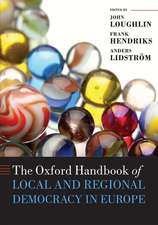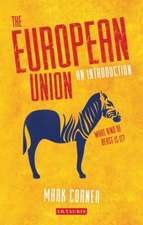New Europe - Old Values?: Reform and Perseverance: Europeanization and Globalization, cartea 1
Editat de Nada Bodiroga-Vukobrat, Siniša Rodin, Gerald Sanderen Limba Engleză Hardback – 24 noi 2015
The immense challenges posed by the market integration imperative and democratic transition have
brought about different reactions in the national legal systems and legal cultures of both old and new Member States. As such, Europe has effectively been reunited, but what about the convergence of national legal cultures? This is the focal point of the remaining chapters, which focus on various issues, from internal market, competition law, consumer welfare, liberalization of network industries to the EU capital market. The magnitude of EU activity in these areas offers conclusive evidence that old and new paradigms are evolving and shaping the future of the EU.
| Toate formatele și edițiile | Preț | Express |
|---|---|---|
| Paperback (1) | 640.55 lei 6-8 săpt. | |
| Springer International Publishing – 23 aug 2016 | 640.55 lei 6-8 săpt. | |
| Hardback (1) | 646.75 lei 6-8 săpt. | |
| Springer International Publishing – 24 noi 2015 | 646.75 lei 6-8 săpt. |
Preț: 646.75 lei
Preț vechi: 760.88 lei
-15% Nou
Puncte Express: 970
Preț estimativ în valută:
123.76€ • 129.54$ • 103.00£
123.76€ • 129.54$ • 103.00£
Carte tipărită la comandă
Livrare economică 31 martie-14 aprilie
Preluare comenzi: 021 569.72.76
Specificații
ISBN-13: 9783319022123
ISBN-10: 3319022121
Pagini: 360
Ilustrații: X, 287 p.
Dimensiuni: 155 x 235 x 25 mm
Greutate: 0.59 kg
Ediția:1st ed. 2016
Editura: Springer International Publishing
Colecția Springer
Seria Europeanization and Globalization
Locul publicării:Cham, Switzerland
ISBN-10: 3319022121
Pagini: 360
Ilustrații: X, 287 p.
Dimensiuni: 155 x 235 x 25 mm
Greutate: 0.59 kg
Ediția:1st ed. 2016
Editura: Springer International Publishing
Colecția Springer
Seria Europeanization and Globalization
Locul publicării:Cham, Switzerland
Public țintă
ResearchCuprins
New Europe-Old Values? Reform and Perseverance. Can Roman Legal Tradition Play a Role of Identity Factor Towards a New Europe? by Tommaso dalla Massara.- One Law, One Court and Human Rights by Vesna Crnić-Grotić and Maša Marochini Zrinski.- European Case-law on Asylum Matters: Interrelation and Interdependence of the European Court of Human Rights and the Court of Justice of the European Union by Nives Mazur Kumrić and Mirela Župan.- New Law and Values: Anti-Discrimination Law in Post-Communist Countries by Snježana Vasiljević.- Getting Women on Company Boards in the EU: A Tale of Power-Balancing in Three Acts by L.A.J. Senden.- The Impact of the Croatian Anti-discrimination Law on Private Law Relations by Emilia Mišćenić.- Social Rights in the Republic of Croatia: Scattered to the Four Winds of Regulation by Sanja Barić and Matija Miloš.- Freedom of Establishment: VALE Case – Direction for New Rules: Dreams or Reality? by Hana Horak and Kosjenka Dumančić.- National Courts and EU Competition Law: Lost in Multilevel Confusion? by Pieter Van Cleynenbreugel.- Think Globally, Act Regionally: How Europeanisation Enhances Consumer Welfare? by Nada Bodiroga-Vukobrat, Ana Pošćić and Adrijana Martinović.- Legal Challenges of the Railway - Liberalization in the EU by Janja Hojnik.- Cash Settled Derivatives and their role in Companies’ Takeovers by Edita Čulinović Herc and Antonija Zubović.- Energy Market Liberalization in the EU: Quo Vadis, Croatia? by Nela Vlahinić.
Textul de pe ultima copertă
This book explores the reactions to Europeanization and globalization in times of economic distress, including the transformation of European values in national legal cultures. The authors explore how European values, tradition and new legal challenges interconnect and dictate the paths of transition between old and new Europe. The first chapter starts with a question: can Roman Legal Tradition play a role of identity factor towards a New Europe? Can it be considered as a general value identifying new Europe, built on a minimum core of principles – persona, dominum, obligation, contract and inheritance – composing the whole European private law tradition? Subsequent chapters attempt to provide possible responses to the question: what is Europe today? The answers diverge, depending on the research area. The inherent dichotomy of human rights protection in Europe and the concept of ‘one law, one court’ are investigated in the second chapter, whereas the third chapter focuses on asylum and the interrelation and interdependence of the Court of Justice of the EU and the European Court of Human Rights. The next three chapters concentrate on matters of equal treatment and non-discrimination. The first contribution in this part reflects on the crisis and methodological and conceptual issues faced by modern anti-discrimination law. It is followed by a specific analysis of the empowerment of women or gender-balancing in company boards. The third contribution reveals the impact of the Croatian anti-discrimination law on private law relations. The next chapter deals with the issue of social rights in Croatia and the method of their regulation in the context of the new European values.
The immense challenges posed by the market integration imperative and democratic transition have
brought about different reactions in the national legal systems and legal cultures of both old and new Member States. As such, Europe has effectively been reunited, but what about the convergence of national legal cultures? This is the focal point of the remaining chapters, which focus on various issues, from internal market, competition law, consumer welfare, liberalization of network industries to the EU capital market. The magnitude of EU activity in these areas offers conclusive evidence that old and new paradigms are evolving and shaping the future of the EU.
The immense challenges posed by the market integration imperative and democratic transition have
brought about different reactions in the national legal systems and legal cultures of both old and new Member States. As such, Europe has effectively been reunited, but what about the convergence of national legal cultures? This is the focal point of the remaining chapters, which focus on various issues, from internal market, competition law, consumer welfare, liberalization of network industries to the EU capital market. The magnitude of EU activity in these areas offers conclusive evidence that old and new paradigms are evolving and shaping the future of the EU.


















